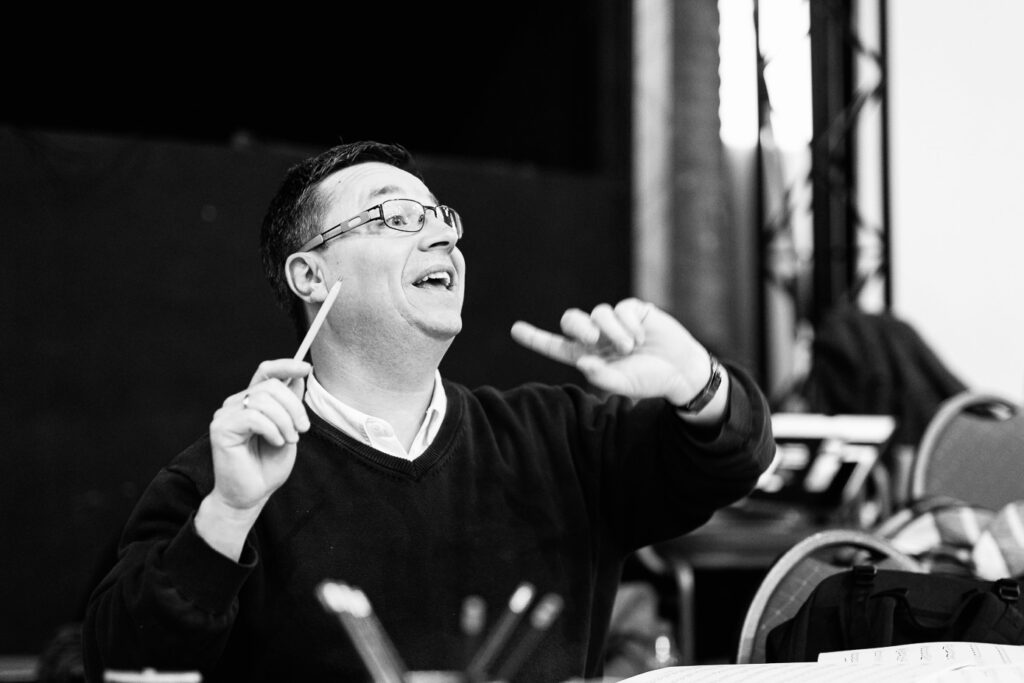Enrico Delamboye about Mozart and Der Schauspieldirektor
Between rehearsals, musical director of Der Schauspieldirektor Enrico Delamboye talks about Mozart’s music, Der Schauspieldirektor and the incredible similarities between then and now when it comes to the opera world.
Opera Zuid presents Der Schauspieldirektor in a new and up-to-date version. Tell us more…
Enrico: ‘True, the Opera Zuid team is creating an unmistakable Der Schauspieldirektor, but in an entirely unique version. With a text by author and director Christopher Gillett and musical additions. In fact, the original was intended to be played only before intermission*. Therefore, we felt some roles – with only one solo piece – were vocally under-served and we integrated even more interesting Mozart arias into this piece.’
What is so interesting and distinctive about Mozart’s music?
Enrico: ‘To begin with, Wolfgang Amadeus Mozart himself was interesting. As far as we can tell he was the utmost in everything. He was an epicurean, a bon vivant, made a game of everything and enjoyed himself intensely. But this put him in trouble more than once, because he lived on (too) big a budget. It even almost cost him his relationship with Constanze. He was a big kid who actually needed an assistant to manage life. Although, that might also have been at the expense of his genius. It was precisely that playing, questioning and wanting to do things just a little differently from the rest that made him write fresh music that is still alive and kicking today.’
Enthusiastically, Delamboye continues: ‘Mozart’s music is energetic, intelligently orchestrated and clearly structured. This orderliness and freshness make the music very accessible. At my request, Der Schauspieldirektor will be played by Philzuid with baroque timpani and natural trumpets; this will probably bring us closer to a more authentic sound in the orchestra. The music itself is timeless. As is the message of Der Schauspieldirektor. Mozart manages to question the audience in a very funny way. Among other things, about the competition in the art world; the positive thing about that is that, as an artist, you want to get the best out of yourself. Elbowing, on the other hand, is what Mozart questions. In the end, he says, “artists should not judge each other and the quality of an artist does not translate into payment. Everyone should give their best and then it is up to the audience to judge”.’
Indeed, that message still seems very relevant…
Enrico: ‘Yes, I find it shocking and wonderful at the same time, that in Der Schauspieldirektor Mozart gives a very good reflection of how things are in the opera world, even more than two hundred years later! Because it is clear that there are many comparisons to be drawn between Der Schauspieldirektor and the opera world here and now. This opera was and is a realistic-critical depiction of the challenges in this little world. It is common knowledge that it is difficult for opera companies to realise beautiful productions with fewer and fewer resources. Nevertheless, we all do our best – out of love for the profession – to work together to achieve a high-quality artistic experience for audiences.’
Do you think audiences will understand the opera world better because of Der Schauspieldirektor?
Enrico: ‘A work like Der Schauspieldirektor is also called a ‘Schmankerl’ in Austria: a delicacy, a tasty morsel. Of course, this Singspiel* is very recognisable and funny for colleagues in the profession. But even people who do not work in the opera world will enjoy the beautiful, well-executed music. Indeed, it really is a tasty bite; not too long, not too short, with very fine Mozart music. The audience may not get all the jokes, but they will at least wonder; is it really like this or is it stagecraft? And that is exactly what Mozart loved doing; playfully questioning the situation. We also constantly ask ourselves: is this the right way? That applies especially to director Christopher, but of course I try to support him in that. That is entirely in the spirit of Mozart and Der Schauspieldirektor: creating beautiful art together!’
*Der Schauspieldirektor was part of a competition launched by Emperor Joseph II. He wanted to put the German Singspiel, with music and spoken texts, back on the map. Mozart’s ‘competitor’ was Salieri, who wrote an Italian opera buffa; Prima la musica e poi le parole (‘First the music, then the words’). One work was played before the interval, the other afterwards. It was then up to the audience to judge which opera was their favourite
Interview: Kyra Bertram
